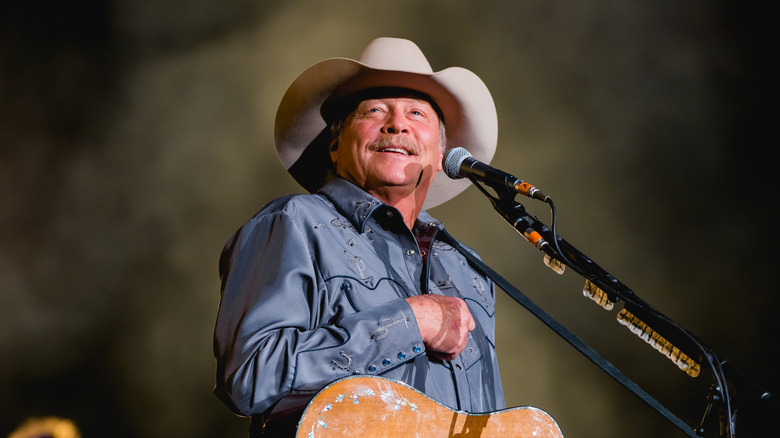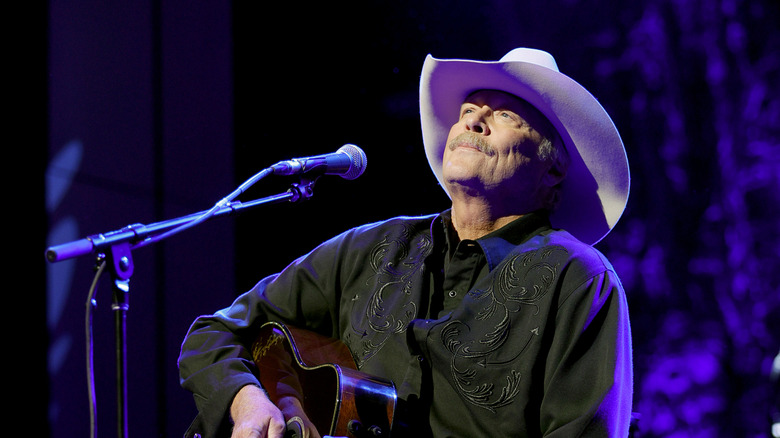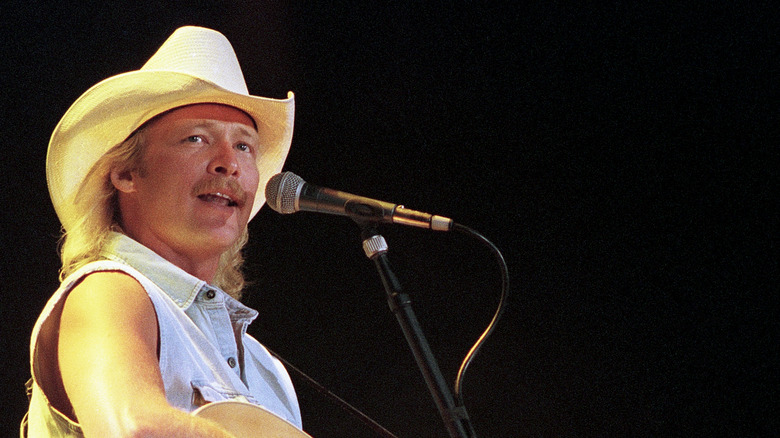The Illness That Ended Alan Jackson's Touring Career
Alan Jackson could be credited with re-popularizing traditional country, ushering in the 1990s with his album "Here in the Real World," and quickly rising to the top of a list of stars who were taking country music back to its roots. He's sold millions of records, won a few Grammy awards along the way, and in 2025, he announced he was finished touring for a tragic reason.
There are a lot of reasons that musicians have cancelled tours, and fans have long suspected that Jackson's touring career was coming to a close. He called his 2025 tour "Last Call: One More for the Road Tour," and was performing in Milwaukee on May 17 when he announced to the crowd that yes, it was his penultimate show. He was confirming what seemed to be inevitable, as four years prior he had revealed that he had been diagnosed with Charcot-Marie-Tooth disease.
Jackson had been candid about the condition in a 2021 interview with Today. He said then that the genetic, degenerative disease had put a timer on his career. "It's not recent, I've been reluctant to talk about this publicly, and with my fans, but it's been a while, and it's starting to affect my performance on stage a little bit, ... and I just wanted the fans and the public to know ... I'm having problems with mobility, and balance. I have this neuropathy, a neurological disease, it's genetic, that I inherited from my daddy. It's called CMT, ironically." But what is this condition?
Charcot-Marie-Tooth impacts nerve and muscle control
Charcot-Marie-Tooth, or CMT, was first identified back in 1886, and may be one of the rare neurological diseases you haven't heard of. There's still a lot that isn't known about it, as it's a genetic disease that has numerous forms and can vary based on the specific genetic mutations that each individual inherits. That includes differences in how the disease functions, but the inevitable outcome is incurable, long-term nerve damage.
The disease is diagnosed by blood tests and monitoring of the nervous system, and symptoms range from scoliosis and foot deformities to weakness and a burning sensation in the muscles. Those diagnosed with it might have difficulty walking, speaking, or even breathing, and might notice a decrease in muscle mass and control. Falls, an inability to run, and an awkward gait are all common.
"It gets worse as it goes along, and there's no cure for it," Alan Jackson told Today in 2021. He also revealed that his father, sister, and grandmother also had CMT, and said that he was seeing some of the same difficulties in his own life that he had seen in his family members. Jackson said that he was having trouble with balance and often found himself stumbling, adding, "So I just feel very uncomfortable, and I just want people to know that's why I look like I do, if they're wondering. And I don't want to appear like some whiny celebrity ... it's just going to disable me, eventually."
Jackson will perform 1 final show in Nashville
Alan Jackson's touring career is at an end, but he did note that he had one final show planned. He wanted to return to Nashville, saying (via People), "It just felt like it had to end where it all started. And that's Nashville, Tennessee. Music City."
Aspiring country stars might spend their lives imagining what it would be like to be inducted into the Grand Ole Opry, and Jackson's induction came in June of 1991. Given that he had released his debut album at the very end of February the previous year, that's a testament to his star power. In something so poetic that it might have been the lyrics to a country song, Jackson had previously worked at the Opry ... sort of: He'd delivered the mail there.
Jackson told Today that he had no regrets. His father had died in his early 70s, he said, and the then-63-year-old Jackson confirmed he was struggling with complications. He added, "I don't want to appear like I'm whining about it, I've had a wonderful, beautiful life. I've been so blessed, I can't even imagine what other people go through." He went on to say that he had always hoped to be like his heroes — naming Merle Haggard and Willie Nelson — who continued to perform, but acknowledged that his health likely would not let him. A retirement tour, he said, would be not a year or two away from the stage, but actual, permanent retirement.


